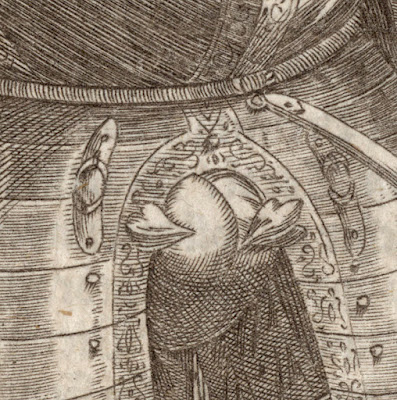Dominicus Custos (aka Dominicus Custodis; Dominicus de Costere)
(c.1559–1615)
“Lansquenet Commander
Sebastian Schertlin von Burtenbach in Armour”, c.1601, after the design by Giovanni
Battista Fontana (1524–87), illustration plate from a German translation of
Jacob Schrenckh von Notzing’s “Armamentarium Heroicum” (1601), published 1603/5.
Woodcut,
etching and engraving on laid paper with small margins lined on a conservator’s
support sheet.
Size: (sheet)
45.2 x 32.9 cm; (plate) 43.6 x 29.8 xm
Hollstein 60.
The curator of
the British Museum offers the following information regarding the series of
prints, “Armamentarium Heroicum”, of which this print is from:
“'Augustissimorum
Imperatorum ... regum... verissimae imagines..' (also known as 'Armamentarium
Heroicum') is the catalogue of the arms collection Archduke Ferdinand II kept
at Ambras castle; it was first published in Innsbruck in 1601. It was
illustrated with a frontispiece and 125 portraits of European princes in full
armour, with decorative surroundings. The plates were engraved by Dominicus
Custos after designs by Giovanni Battista Fontana. Each plate was accompanied
by a short biographical text on the former owner of the armour, written by
Jacob Schrenk von Notzing.
A German
translation of the book (by J. E. Noyse von Campenhouten) was published in 1603
under the title 'Der aller Durchleuchtigisten und Grossmächtigen Kayser,
Durchleuchtigisten unnd Großmächtigen Königen...'.
A third edition
including 123 plates was issued in Innsbruck in 1605.”
Condition: slightly
silvery impression with a few spots of abrasion, and restoration. The sheet has
be laid onto a conservator’s support sheet. There are traces hand-written
script in brown ink with the name of the portrayed luminary (Sebastian
Schertlin von Burtenbach) inscribed in the blank tablet at the lower centre.
The sheet is in a restored clean condition.
I am selling important
large print from the first museum catalogue every printed for AU$165 in total
(currently US$126.63/EUR119.97/GBP101.54 at the time of posting this listing)
including postage and handling to anywhere in the world.
If you are
interested in purchasing this historically significant print from the
Renaissance era, please contact me (oz_jim@printsandprinciples.com) and I will
send you a PayPal invoice to make the payment easy.
This full
length portrait of Sebastian Schertlin von Burtenbach, is far more than a fine
example why women should never design armour protection for codpieces. After all, no man would ever choose to have sharp pointed devices around his delicate bits. Indeed,
it is part of a series of 125 engraved portraits, the "Armamentarium
Heroicum", which holds the historically very significant position of being
the very first museum catalogue in the world. Each of the plates, like this
one, showcases the armour worn by the featured luminary and the set of prints
is considered to be a museum catalogue because (unless I am mistaken) all the
pieces of armour were in the collection of Archduke Ferdinand II (of Tyrol) and
kept in the Ambras Palace near Innsbruck. Moreover, each plate is accompanied
with biographical details about the owner of the armour written by the
Archduke's secretary, Jacob Schrenck von Notzing (1539–1612).
Beyond being a
part of the first illustrated document—a paper museum— of a collection, this
print has another notable attribute that is also fascinating: according to the British Museum the prints of the
“Armamentarium Heroicum” are not just engravings they are an amalgam of
intaglio (etching and engraving) and relief (woodcut) printing.
For those that
are interested in the subject of this portrait, Schertlin von Burtenbach (1496
–1577) served under Emperor Maximilian I as a mercenary field captain until his
elevation in 1532 to the rank of infantry Commander-in-Chief of the whole of the
Army of the Holy Roman Empire. Interestingly (and I am undoubtedly wrong about
this), his main role was as a “Brandschatzmeister”—the chap responsible for
pillaging.






No comments:
Post a Comment
Please let me know your thoughts, advice about inaccuracies (including typos) and additional information that you would like to add to any post.